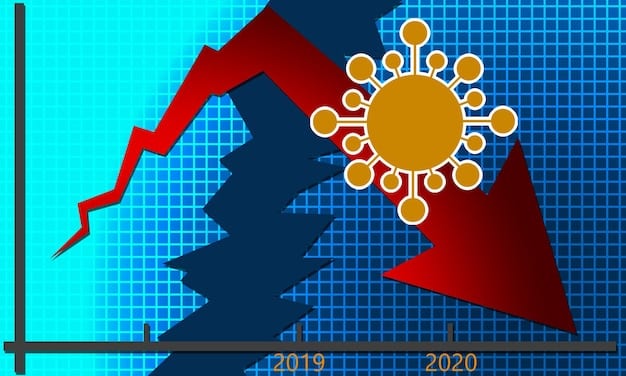Inflation Alert: Understand How CPI Data Impacts Your Finances

Inflation Alert: How the Latest CPI Data Will Affect Your Finances explores the Consumer Price Index (CPI) and its profound implications for your financial well-being, covering investments, savings, and everyday expenses.
Are you feeling the pinch of rising prices? The latest CPI data is a key indicator of inflation’s impact. This article, Inflation Alert: How the Latest CPI Data Will Affect Your Finances, breaks down what it means for you.
Understanding the Consumer Price Index (CPI)
The Consumer Price Index (CPI) is a vital economic indicator. It measures the average change over time in the prices paid by urban consumers for a market basket of consumer goods and services. Understanding the CPI is crucial for grasping the overall inflation landscape.
The CPI serves as a benchmark for inflation. It is used by economists, policymakers, and financial professionals to assess economic trends and make informed decisions.
What Does the CPI Measure?
The CPI tracks the prices of various goods and services. These are categorized into major groups such as food, housing, apparel, transportation, medical care, recreation, education, and communication.
How Is the CPI Calculated?
The CPI calculation involves several steps. It begins with selecting a base year and assigning it an index value of 100. Subsequent years’ values are calculated relative to this base year.
- Data Collection: The Bureau of Labor Statistics (BLS) collects price data monthly from thousands of retail stores, service establishments, rental units, and doctors’ offices across the country.
- Weighting: The prices are weighted according to the spending habits of the average urban consumer.
- Index Calculation: The CPI is calculated by comparing the current cost of the basket of goods and services to the cost in the base year.
The CPI data is not just a number; it’s a reflection of real-world economic conditions. Changes in CPI can significantly affect financial planning, investment strategies, and overall economic stability.
The Latest CPI Data: Key Takeaways
The latest CPI data reveals important trends in the economy. These insights can help individuals and businesses make more informed financial decisions.
Analyzing the latest CPI figures provides a snapshot of the current inflationary pressures. It offers guidance on how to navigate the evolving financial landscape.

Significant Changes in Inflation Rates
Recent reports highlight variations in inflation rates across different sectors. Some sectors may experience higher inflation than others, impacting consumer spending and investment patterns.
Sectors Experiencing High Inflation
Certain sectors often lead the way in inflation spikes. Understanding these trends is essential for adapting financial strategies.
- Energy: Fluctuations in oil and gas prices frequently drive inflation.
- Food: Supply chain issues and weather events can cause spikes in food prices.
- Housing: Rental costs and home prices significantly impact the overall CPI.
A careful examination of these key takeaways provides a foundation for understanding the broader implications of inflation. It sets the stage for proactive financial management.
How CPI Data Affects Your Investments
CPI data has a direct impact on investment strategies. Rising inflation can erode the real value of returns, necessitating adjustments in investment portfolios.
Understanding how inflation influences different asset classes is essential for maximizing investment gains. Diversification and strategic asset allocation become crucial in inflationary environments.
Impact on Stocks and Bonds
Stocks and bonds react differently to inflationary pressures. Knowing these dynamics is key to building a resilient investment portfolio.
Strategies for Inflation-Resistant Investing
Certain investment strategies can help mitigate the negative effects of inflation. These include:
- Investing in Treasury Inflation-Protected Securities (TIPS): These bonds are indexed to inflation, protecting their real value.
- Diversifying into Real Assets: Real estate and commodities can offer a hedge against inflation.
- Focusing on Value Stocks: Companies with strong financial fundamentals can weather inflationary storms better.
By understanding these impacts and implementing appropriate strategies, investors can protect and grow their wealth in inflationary times.
The Impact on Savings and Purchasing Power
Inflation erodes the purchasing power of savings. Understanding this effect is essential for long-term financial planning.
The real value of savings diminishes as inflation rises. This requires individuals to consider strategies to maintain or increase their purchasing power.
How Inflation Reduces Purchasing Power
Inflation decreases the amount of goods and services that can be purchased with a fixed amount of money. This impacts consumers’ ability to maintain their living standards.
Strategies to Protect Your Savings
Several strategies can help protect savings from the adverse effects of inflation:
- High-Yield Savings Accounts: These accounts offer higher interest rates, helping to offset inflation.
- Certificates of Deposit (CDs): CDs provide a fixed interest rate for a specific period, offering some protection against inflation.
- Investing in Inflation-Adjusted Assets: As mentioned earlier, TIPS and real assets can help preserve purchasing power.
Protecting savings from inflation requires proactive measures. By understanding the impact of inflation and adopting appropriate strategies, individuals can safeguard their financial future.
Managing Your Budget During Inflation
Budgeting is crucial during inflationary periods. Effective budget management can help individuals maintain financial stability despite rising prices.
Adapting spending habits and identifying cost-saving opportunities are essential for navigating inflation. Creating a well-structured budget is the first step toward financial resilience.
Tips for Effective Budgeting
Effective budgeting involves tracking income and expenses. This process helps identify areas where spending can be reduced.
Cost-Saving Strategies
Numerous cost-saving strategies can help consumers manage rising prices:
- Meal Planning: Planning meals in advance reduces food waste and unnecessary spending.
- Energy Conservation: Reducing energy consumption lowers utility bills.
- Comparison Shopping: Comparing prices before making purchases ensures the best deals.
Managing a budget effectively during inflation requires discipline and strategic planning. By adopting these strategies, individuals can mitigate the financial impact of rising prices.
Government Policies and CPI Data
Government policies are closely tied to CPI data. Policy decisions influence inflation and economic growth.
Central banks and governments use CPI data to formulate monetary and fiscal policies. These policies aim to control inflation, stimulate economic growth, and maintain stability.
How the Federal Reserve Uses CPI Data
The Federal Reserve (the Fed) relies heavily on CPI data to make decisions about interest rates and monetary policy. Adjusting interest rates is one of the primary tools the Fed uses to influence inflation.
Fiscal Policy Measures
Governments use fiscal policy to address inflation. Tax policies and spending programs can influence aggregate demand and price levels.
Government policies play a crucial role in managing inflation and maintaining economic stability. Understanding these policies and their connection to CPI data is essential for informed financial decision-making.
| Key Point | Brief Description |
|---|---|
| 📊 Understanding CPI | Measures the average change in prices paid by urban consumers for goods and services. |
| 💸 Investment Impact | Inflation erodes investment returns, necessitating diversified strategies. |
| 💰 Savings Protection | Inflation reduces purchasing power; high-yield accounts and inflation-adjusted assets can help. |
| 🛡️ Budgeting | Effective budgeting and cost-saving strategies are crucial for managing finances during inflation. |
Frequently Asked Questions (FAQ)
▼
The Consumer Price Index (CPI) is a measure that examines the weighted average of prices of a basket of consumer goods and services, such as transportation, food, and medical care. It is calculated by taking price changes for each item in the predetermined basket of goods and averaging them.
▼
CPI data influences investment decisions by indicating inflation levels. Higher inflation can erode the real value of returns. Investors may shift to inflation-resistant assets like TIPS or real estate to preserve capital.
▼
Treasury Inflation-Protected Securities (TIPS) are bonds indexed to inflation. Their principal value increases with inflation and decreases with deflation, as measured by the CPI. This helps protect investors from inflation’s impact on their investments.
▼
To protect savings, consider high-yield savings accounts, certificates of deposit (CDs), and inflation-adjusted assets. These options offer higher returns or adjustments that can offset the erosion of purchasing power due to inflation.
▼
Implement strategies such as meal planning, reducing energy consumption, and comparison shopping to manage rising prices. These measures help cut unnecessary expenses and maintain financial stability during inflationary periods.
Conclusion
Staying informed about the latest CPI data and understanding its implications is crucial for making sound financial decisions. By adapting investment strategies, protecting savings, and managing budgets effectively, individuals can navigate inflationary periods and maintain financial well-being.





